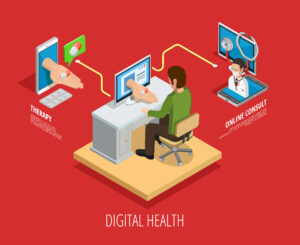Each second in hospitals draws a line between life and death. So percision in each step is necessary in the healthcare sector. Time management, seamless communication and strong coordination are the few factors to adress emergencies.
Traditional phone systems provide disruptive communication. In this method patients cannot communicate with doctors properly due to a lack of network or resource availability. It can break the flow of smooth coordination between medical staff. A break of communication can lead to severe damage. Therefore an efficient and reliable communication system is needed for the healthcare industry. VoIP phone systems can fulfill this need.
VoIP is continuously transforming communication systems by streamlining them. As a result, it can offer seamless communication among doctors, patients, and other administrative staff.
Here we will see how a VoIP system can fulfill the fast-changing communication needs of the healthcare industry.
Let’s see how does a VoIP system Transform Healthcare?
Manage Workload with VoIP
Task management is a big challenge for healthcare personnel. It is because proactive approaches are always essential to deal with emergency cases. It will be a nightmare if communication breaks during this time. It will be a problem for medical staff to manage communication and patient queries simultaneously.
Don’t Worry; VoIP can manage your workload.
VoIP system can manage the communication process single-handedly. It provides a variety of valuable features that can ease everyday communication. It lowers the burden on medical professionals. So they can focus more on their patients.
Let’s go through a couple of examples.
- Auto-attendants can instantly link patients with the relevant departments using a call-routing system. It provides callers with an easily accessible voice menu. They can choose departments according to their issue. This setup reduces wait times and eases the work of receptionists.
- VoIP systems can convert voicemails to easily readable text formats. So doctors can easily handle prescriptions using Voicemail to text editor features. It saves time by making information more accessible and easy to use.
Enhance Primary Healthcare

Imagine that there is an accident and the patient’s condition is severe. One of the people from the crowd calls the doctor and explains the situation. He is continuously stammering due to fear. Finally, he says it will take more than one hour to reach the hospital.
What will a doctor do? There needs to be more than simple telephonic communication to resolve this problem.
Now imagine if the doctor can connect a video call with the patient then he can understand the situation better. He can advise on some primary treatments, like covering the wounds to avoid blood loss or recommending drinking more water.
Think how useful it will be. It can restrict many complications that may arise due to the lack of primary health care.
VoIP allows you to connect to your patients via multiple mediums. So whether it’s a video call or a voice call, VoIP connects you to everything when you need it.
Improve Productivity Using VoIP
Each call from a patient is essential, and VoIP makes you never miss a single call.
Suppose a patient connects a call, but the doctor is busy on another call. Here the VoIP system reroutes the call to another available physician.
What if there is an emergency and your specialist is on holiday? What to do?
Worry not, VoIP can route the calls to your specialist’s smartphone, and he can provide consultation. In addition, VoIP allows you to connect with anyone from any device.
Effortless Task Management
Tasks in hospitals are like bids on a string, which means they are interconnected. For example, the receptionist fix appointments for patients. After that, the doctors meet the patient and give a consultation for treatment. After that, pharmacists need to dispense medications by reading prescriptions.
The VoIP system helps admins to manage tasks efficiently. “But how?” You have this question in mind.
Let’s understand the answer with a small story.
Imagine Tim, a diabetes patient and wants to consult a doctor regarding his abnormal sugar levels. But he is out of town, and the hospital is out of his reach. What will Tim do? Will he wait for some days? The answer is NO.
Because Tim knows that the hospital he used to visit is using a VoIP system for patient care. Therefore he can fix a virtual appointment with the doctor with the help of this VoIP system. Auto-receptionist helps him to choose the desired department and schedule a time and confirm the virtual consultation smoothly.
After that, Tim can meet the doctor in a virtual meeting room created by VoIP. After consultation, the Voicemail transcription edits the conversation into text format and transfers the prescription to the pharmacy.
The pharmacist can now dispense medicines. With VoIP innovative CRM, the pharmacist can dispense appropriate medication using patient history. Now Tim can get his treatment using home delivery. A delivery agent can connect with Tim by using VoIP for hassle-free delivery.
Isn’t it easier and more comfortable? There will be no headaches for appointments or a long wait in the queue for consultation. VoIP helps to reduce workload and streamline the medical journey in the initial stages.
Additional Benefits of Using VoIP
- Cost-Saving: You must pay for the service whether you use traditional phones or not. On the other hand, VoIP works on a pay-as-you-go structure, where you only pay for the calls you make.
- Information Security: VoIP is a cloud-based communications solution, so it minimizes the fear of information leaking. But unfortunately, it is a significant problem associated with traditional phone lines.
Evolve Healthcare Industry With VoIP
Healthcare is a high-stress, time-consuming industry. Each day, you will be assigned to meet new people, solve new issues, and interact with specialists. The old phone system takes longer to coordinate all these activities, but the VoIP system connects you to anybody in seconds. It also saves money for other clinical purposes. So Which one will you pick?

